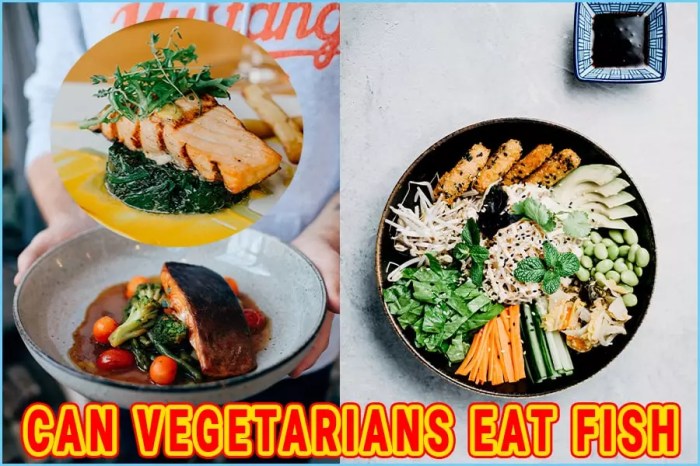Can vegetarians eat fish? This question sparks a lively debate that delves into the intricacies of vegetarianism, the classification of fish, dietary considerations, ethical implications, cultural and religious perspectives, health benefits and risks, environmental impact, and future trends. Join us as we navigate this multifaceted topic, unraveling the nuances that shape the vegetarian lifestyle and its relationship with fish consumption.
At the heart of this discussion lies the definition of vegetarianism, which encompasses a spectrum of dietary choices that exclude meat, poultry, and sometimes other animal products. As we delve deeper, we’ll explore the different types of vegetarian diets, including lacto-vegetarian, ovo-vegetarian, and vegan, examining their unique characteristics and nutritional implications.
Vegetarianism Definition
Vegetarianism is a type of diet that excludes the consumption of meat, poultry, fish, and seafood. It emphasizes the consumption of plant-based foods such as fruits, vegetables, grains, legumes, nuts, and seeds.
Embark on a transformative journey towards a healthier you with a healthy vegetarian diet plan for weight loss. Designed to nourish your body and promote sustainable weight management, this comprehensive plan offers a balanced intake of fruits, vegetables, whole grains, and legumes, providing you with the essential nutrients your body needs while helping you shed unwanted pounds.
There are different types of vegetarian diets, including:
- Lacto-vegetarian:Consumes dairy products but excludes eggs, meat, poultry, fish, and seafood.
- Ovo-vegetarian:Consumes eggs but excludes dairy products, meat, poultry, fish, and seafood.
- Lacto-ovo vegetarian:Consumes both dairy products and eggs but excludes meat, poultry, fish, and seafood.
- Vegan:Excludes all animal products, including meat, poultry, fish, seafood, dairy products, eggs, and honey.
Fish Classification

Fish are a diverse group of aquatic vertebrates that are characterized by gills, fins, and a streamlined body. They are classified under the phylum Chordata and the subphylum Vertebrata.
Fish are further divided into two main groups: bony fish and cartilaginous fish. Bony fish, also known as Osteichthyes, have a skeleton made of bone, while cartilaginous fish, also known as Chondrichthyes, have a skeleton made of cartilage.
Bony Fish, Can vegetarians eat fish
- Bony fish are the most common type of fish, and they include species such as tuna, salmon, and cod.
- They have a skeleton made of bone, which is covered by scales.
- Bony fish have a swim bladder, which is a gas-filled organ that helps them to maintain their buoyancy.
Cartilaginous Fish
- Cartilaginous fish include species such as sharks, rays, and skates.
- They have a skeleton made of cartilage, which is a flexible tissue.
- Cartilaginous fish do not have a swim bladder, so they must constantly swim to avoid sinking.
Dietary Considerations
Vegetarian diets offer numerous nutritional benefits, including a reduced risk of chronic diseases like heart disease, stroke, and certain types of cancer. They are also rich in fiber, vitamins, and minerals. However, vegetarians need to be mindful of certain nutrient deficiencies, such as vitamin B12, iron, calcium, and omega-3 fatty acids.
Vitamin B12 is essential for red blood cell production and nerve function. It is primarily found in animal products, so vegetarians must supplement their diet with fortified foods or supplements.
Iron
Iron is necessary for oxygen transport throughout the body. Vegetarians can obtain iron from plant-based sources such as lentils, beans, and leafy green vegetables. However, the iron in plant-based foods is not as easily absorbed as the iron in animal products.
Vegetarians may need to consume more iron-rich foods or consider supplementation.
Calcium
Calcium is crucial for bone health and nerve function. Dairy products are a rich source of calcium, but vegetarians can also obtain calcium from fortified plant-based milks, leafy green vegetables, and tofu.
Omega-3 Fatty Acids
Omega-3 fatty acids are essential for heart and brain health. They are primarily found in fatty fish, but vegetarians can obtain them from plant-based sources such as flaxseeds, chia seeds, and walnuts.
Ethical Implications
Vegetarianism raises significant ethical concerns regarding animal welfare and the treatment of sentient beings. Proponents of vegetarianism argue that consuming animals is morally wrong because it involves the unnecessary killing and exploitation of sentient creatures. They believe that animals have the capacity to suffer and experience pain, and that it is unethical to cause them harm for our own pleasure or convenience.
Arguments for Vegetarianism
- Animal Sentience:Animals are sentient beings capable of experiencing pain, joy, fear, and other emotions. Killing and consuming animals for food deprives them of their lives and inflicts unnecessary suffering.
- Environmental Impact:Animal agriculture has a significant environmental impact, contributing to greenhouse gas emissions, deforestation, and water pollution. Vegetarianism can help reduce these negative effects.
- Health Benefits:Vegetarian diets have been associated with improved health outcomes, including reduced risk of heart disease, certain cancers, and obesity.
Arguments Against Vegetarianism
- Nutritional Adequacy:Critics argue that vegetarian diets may not provide all the essential nutrients required for optimal health, particularly vitamin B12 and certain amino acids.
- Cultural and Tradition:Many cultures and traditions revolve around the consumption of animal products, and transitioning to a vegetarian diet may be challenging for some individuals.
- Economic Impact:Animal agriculture is a major industry, and a widespread shift to vegetarianism could have economic consequences for farmers and businesses involved in meat production.
Cultural and Religious Perspectives: Can Vegetarians Eat Fish

Vegetarianism has been influenced by cultural and religious beliefs for centuries. In some cultures, it is considered a sign of purity or piety, while in others, it is associated with health or environmental concerns.
Hinduism
Hinduism is one of the oldest religions in the world, and it has a long tradition of vegetarianism. The cow is considered a sacred animal in Hinduism, and many Hindus believe that it is wrong to eat its flesh. Additionally, Hindus believe in the principle of ahimsa, or non-violence, which extends to all living beings, including animals.
Buddhism
Buddhism also promotes vegetarianism, as it is considered a way to cultivate compassion and avoid harming others. The Buddha himself is said to have been a vegetarian, and many Buddhists believe that eating meat is a form of violence.
Jainism
Jainism is a religion that originated in India, and it has one of the strictest vegetarian traditions in the world. Jains believe that all living beings have souls, and they avoid eating any food that contains animal products. This includes not only meat, but also eggs, dairy, and honey.
Health Benefits and Risks
Vegetarian diets offer numerous potential health benefits, including a reduced risk of chronic diseases such as heart disease, stroke, type 2 diabetes, and some types of cancer. Plant-based foods are typically rich in fiber, vitamins, minerals, and antioxidants, which are essential for overall health and well-being.
However, it’s important to note that vegetarian diets can also pose certain health risks or limitations if not planned and executed carefully. For example, vegetarians may need to pay attention to ensuring adequate intake of essential nutrients such as protein, iron, vitamin B12, and calcium.
Proper planning and consultation with a registered dietitian or healthcare professional can help mitigate these risks and ensure a balanced and nutritious vegetarian diet.
If you’re looking to shed a few pounds, consider adopting a healthy vegetarian diet plan for weight loss. Vegetarian diets are rich in fiber, which can help keep you feeling full and satisfied throughout the day. They’re also low in saturated fat and cholesterol, which can help reduce your risk of heart disease.
Potential Health Benefits
- Reduced risk of heart disease: Vegetarian diets are typically low in saturated fat and cholesterol, which can help lower blood pressure and reduce the risk of heart disease.
- Lower risk of stroke: Vegetarian diets are rich in fruits, vegetables, and whole grains, which are all associated with a lower risk of stroke.
- Reduced risk of type 2 diabetes: Vegetarian diets are high in fiber, which can help regulate blood sugar levels and reduce the risk of developing type 2 diabetes.
- Lower risk of certain types of cancer: Vegetarian diets are rich in antioxidants, which can help protect cells from damage and reduce the risk of developing certain types of cancer, such as colon cancer and prostate cancer.
Potential Health Risks or Limitations
- Protein deficiency: Vegetarian diets can be low in protein, especially if not planned carefully. It is important to include good protein sources such as beans, lentils, tofu, and nuts in a vegetarian diet.
- Iron deficiency: Vegetarian diets can be low in iron, especially non-heme iron, which is less easily absorbed by the body than heme iron from animal products. It is important to include good iron sources such as fortified cereals, beans, and leafy green vegetables in a vegetarian diet.
- Vitamin B12 deficiency: Vitamin B12 is only found in animal products, so vegetarians need to make sure to get enough vitamin B12 from fortified foods or supplements.
- Calcium deficiency: Vegetarian diets can be low in calcium, especially if dairy products are not consumed. It is important to include good calcium sources such as fortified plant milks, leafy green vegetables, and tofu in a vegetarian diet.
Environmental Impact
Vegetarianism has a lower environmental impact compared to non-vegetarian diets. Animal agriculture is a major contributor to greenhouse gas emissions, deforestation, and water pollution. By choosing a plant-based diet, individuals can significantly reduce their carbon footprint and support sustainable food systems.
Role of Vegetarianism in Promoting Sustainable Food Systems
* Reduced Greenhouse Gas Emissions:Animal agriculture is responsible for a significant portion of global greenhouse gas emissions, particularly methane and nitrous oxide. Vegetarian diets eliminate or reduce these emissions, contributing to climate change mitigation.
Preservation of Land Resources
Animal grazing requires vast amounts of land, leading to deforestation and habitat loss. Vegetarianism reduces the demand for land for animal production, allowing for reforestation and conservation of natural ecosystems.
Water Conservation
Animal agriculture is a major consumer of water, especially for irrigation of feed crops and waste disposal. Vegetarian diets require significantly less water, reducing strain on water resources.
Pollution Reduction
Animal agriculture generates large amounts of manure and wastewater, which can pollute water bodies and contribute to eutrophication. Vegetarian diets reduce this pollution by eliminating or minimizing animal waste production.
Future Trends

Vegetarianism continues to evolve, driven by growing awareness of ethical, environmental, and health concerns. Innovations in plant-based alternatives are transforming the way we think about meat and fish consumption.
Plant-based alternatives have made significant strides in taste, texture, and nutritional value. Companies are investing heavily in research and development, creating products that mimic the sensory experience of animal products.
Plant-Based Alternatives
- Meat Alternatives:Plant-based meats, such as those made from soy, pea protein, or mycoprotein, provide a high-protein option for vegetarians and meat-reducers.
- Fish Alternatives:Plant-based fish, made from algae or seaweed, offer a sustainable and cruelty-free alternative to traditional seafood.
- Dairy Alternatives:Plant-based milk, cheese, and yogurt are widely available, providing calcium, protein, and other nutrients.
Final Summary
The debate surrounding vegetarianism and fish consumption continues to evolve, reflecting the dynamic nature of our food systems and ethical considerations. As we navigate this ever-changing landscape, it’s essential to approach these discussions with an open mind, embracing diverse perspectives and seeking a deeper understanding of the choices we make.
Whether you’re a seasoned vegetarian, a curious carnivore, or simply seeking to expand your culinary horizons, this comprehensive guide provides a wealth of information to inform your journey.
FAQ Explained
Can vegetarians eat seafood?
The answer to this question depends on the individual’s definition of vegetarianism. Some vegetarians choose to include seafood in their diet, while others abstain from all animal products, including fish and shellfish.
Is fish considered meat?
Biologically speaking, fish are classified as animals and their flesh is considered meat. However, some vegetarians may choose to include fish in their diet due to cultural, religious, or personal beliefs.
What are the health benefits of a vegetarian diet?
Vegetarian diets have been associated with a reduced risk of chronic diseases such as heart disease, stroke, type 2 diabetes, and some types of cancer. Vegetarian diets are also typically high in fiber, vitamins, and minerals.